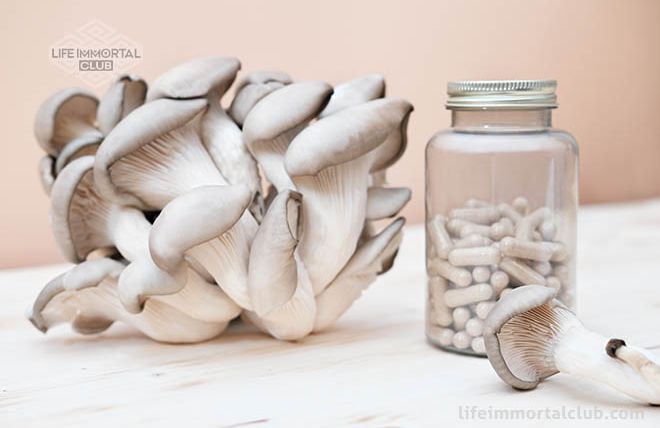What are the benefits of Chaga mushroom supplements?

What Is the Chaga Mushroom?
Nestled within the vast woodlands of birch trees, the Chaga mushroom is a fascinating fungus that has garnered immense attention in recent years due to its remarkable health benefits. Also known as Inonotus obliquus, the Chaga mushroom is characterized by its dark, rugged appearance and its parasitic nature, growing predominantly on the trunks of birch trees. Renowned for its adaptogenic and immune-boosting properties, this unique mushroom has become a popular choice among those seeking natural remedies to enhance their overall well-being.
Chaga mushrooms have been traditionally used for centuries in various cultures, including those found in Siberia and northern Canada. In these regions, where harsh climates prevail, indigenous communities have relied on the healing power of Chaga to support their health and vitality.
Its utilization can be traced back to ancient times when it was consumed as a decoction or tea to promote longevity and strengthen the immune system. Chaga mushrooms are highly sought after not only for their therapeutic potential but also for their rich nutritional profile.
They contain an array of bioactive compounds such as polysaccharides (including beta-glucans), melanin, triterpenes, sterols, and various other antioxidants. These constituents work synergistically to provide unique health benefits that make Chaga mushrooms an extraordinary addition to one's wellness routine.
The Chaga mushroom stands out as a remarkable natural resource with significant health-enhancing properties. Its long-standing use by indigenous cultures underscores its potential efficacy in promoting overall well-being.
The biohacking community has now begun recognizing the myriad benefits offered by this wild mushroom through supplements such as teas and extracts. As we delve deeper into understanding its medicinal value and unlocking its full potential through scientific research, it becomes clear that incorporating Chaga mushroom supplements can be a valuable strategy for supporting optimal health holistically.
Why Chaga Mushroom Health Benefits are So Diverse
The Chaga mushroom, scientifically known as Inonotus obliquus, is a peculiar fungus that grows predominantly on birch trees in cold regions such as Siberia, Northern Europe, and Canada. Its unique appearance, resembling a blackened mass protruding from tree bark, belies its incredible health benefits. What sets the Chaga mushroom apart is the extraordinary diversity of its health benefits.
This multifaceted fungus owes its versatility to a rich array of bioactive compounds found within it. One key factor contributing to the Chaga mushroom's diverse health benefits is its potent antioxidant properties.
Antioxidants are substances that help protect our cells from damage caused by harmful free radicals. The Chaga mushroom contains an abundance of antioxidants such as superoxide dismutase (SOD), melanin, and polyphenols.
Due to their chemical structure and stability, these antioxidants have the ability to neutralize free radicals effectively. In addition to antioxidants, the Chaga mushroom boasts an array of immune-modulating compounds that enable it to support our body's defense mechanisms.
Polysaccharides found in Chaga mushrooms have been shown to enhance immune function by activating specific cells involved in fighting off infections and preventing chronic diseases. Furthermore, studies have indicated that beta-glucans present in Chaga mushrooms can stimulate macrophages and natural killer cells, which play crucial roles in recognizing and eliminating foreign invaders within our bodies.
Another noteworthy aspect of the Chaga mushroom's diverse health benefits lies in its potential for skin rejuvenation. Rich in nutrients like vitamins D2 and K2 as well as minerals such as copper, zinc, manganese, and selenium; this fungus has been utilized for centuries to promote healthy skin appearance and vitality.
Recent scientific research has further identified specific components within the Chaga mushroom responsible for reducing oxidative stress on skin cells while promoting collagen synthesis and improving overall skin texture. By harnessing these unique characteristics of wild chaga mushrooms, individuals have begun biohacking their health and well-being, incorporating this medicinal fungus into their daily routines.
Whether consumed as a tea, taken in the form of dietary supplements, or used topically in skincare products, chaga mushroom enthusiasts are embracing its diverse benefits with enthusiasm and curiosity. Undoubtedly, the Chaga mushroom's remarkable adaptability and wide-ranging health advantages make it an intriguing subject in the world of natural remedies and modern wellness practices.
Polysaccharides (Including Beta-Glucans)
Polysaccharides, including beta-glucans, are one of the key components found in Chaga mushrooms that contribute to their numerous health benefits. Polysaccharides are complex carbohydrates made up of long chains of sugar molecules.
These compounds have been extensively studied for their immunomodulatory properties and ability to support overall health. Beta-glucans, a specific type of polysaccharide present in Chaga mushrooms, are known for their potent immune-enhancing effects.
These bioactive compounds have been shown to stimulate various immune cells such as macrophages, natural killer cells, and dendritic cells, which play crucial roles in defending the body against infections and diseases. Furthermore, beta-glucans possess powerful antioxidant properties that help neutralize harmful free radicals and reduce oxidative stress within the body.
This is particularly important as oxidative stress has been linked to various chronic diseases such as cancer, cardiovascular disease, and neurodegenerative disorders. Research suggests that the unique structure of beta-glucans allows them to bind to receptors on immune cells, initiating a cascade of events that activate the immune system.
This activation triggers an increase in the production of cytokines – signaling molecules that regulate immune responses – thereby promoting a more robust and efficient defense against pathogens. In addition to their impact on immunity, polysaccharides found in Chaga mushrooms may also have potential anti-inflammatory effects.
Chronic inflammation is associated with many health problems including heart disease, diabetes, and autoimmune conditions. By modulating inflammatory pathways within the body, Chaga mushroom polysaccharides could help alleviate inflammation-related symptoms and promote overall well-being.
It's worth noting that while research surrounding Chaga mushroom polysaccharides is promising, more studies are needed to fully understand their mechanisms of action and therapeutic potential. Nevertheless, incorporating Chaga mushroom supplements or extracts rich in these bioactive compounds into one's daily routine may offer a natural way to support immunity, reduce inflammation, and promote overall health and vitality.
Melanin
is a fascinating component found in Chaga mushrooms that contributes to their numerous health benefits. is a pigment that gives color to our hair, skin, and eyes. However, its importance goes beyond aesthetics, as it plays a crucial role in protecting our bodies against harmful ultraviolet (UV) radiation and other environmental stressors.
Chaga mushrooms are rich in melanin, particularly a type called eumelanin. This type of melanin possesses strong antioxidant properties and helps shield our skin from the damaging effects of UV rays.
Regular consumption of Chaga mushroom supplements can therefore provide additional protection against sunburns, premature aging, and even skin cancer. Furthermore, melanin in Chaga mushrooms has been found to have immune-boosting effects.
It stimulates the production of certain immune cells such as natural killer cells and macrophages, which help defend the body against pathogens and potentially harmful substances. This immune modulation can enhance our body's ability to fight off infections and maintain overall wellness.
In addition to its protective properties, melanin also exhibits anti-inflammatory effects. Chronic inflammation is associated with various health conditions such as arthritis, heart disease, and even cancer.
By reducing inflammation, Chaga mushrooms' melanin content may contribute to the prevention or management of these conditions. To harness the benefits of melanin in Chaga mushrooms effectively, it is crucial to ensure proper extraction methods when preparing supplements or consuming Chaga mushroom tea.
Proper identification of wild Chaga mushrooms by trained experts is essential to ensure purity and potency since there are other fungi that resemble Chaga but lack its beneficial compounds. The presence of melanin in Chaga mushrooms offers significant advantages for human health.
From protecting our skin against harmful UV radiation to boosting immunity and reducing inflammation - this natural compound plays a vital role in supporting overall well-being. By incorporating Chaga mushroom supplements into your daily routine or enjoying a cup of nutrient-rich Chaga mushroom tea, you can leverage the power of melanin and biohack your way to better health.
Triterpenes
are a class of chemical compounds found abundantly in chaga mushrooms, contributing to their impressive health benefits. These bioactive compounds have garnered considerable attention due to their potential therapeutic properties, making chaga mushroom supplements highly sought after.
are characterized by their unique structure consisting of multiple isoprene units, which gives them a wide range of biological activities. One of the primary triterpenes found in chaga mushrooms is betulinic acid, which is not naturally present in the mushroom itself but rather obtained through its symbiotic relationship with birch trees.
Betulinic acid has been extensively studied for its anti-tumor properties and potential inhibitory effects on tumor growth. Research suggests that betulinic acid can induce apoptosis (programmed cell death) in cancer cells while sparing healthy cells, making it a promising candidate for future cancer therapies.
In addition to betulinic acid, another triterpene called inotodiol has been identified in chaga mushrooms. Inotodiol possesses potent anti-inflammatory and antioxidant properties.
Studies have indicated that this compound may inhibit the production of pro-inflammatory cytokines and reduce oxidative stress markers, potentially helping to mitigate chronic inflammation and associated health conditions. Furthermore, triterpenes found in chaga mushrooms have demonstrated immunomodulatory effects by stimulating the activity of immune cells such as natural killer (NK) cells and macrophages.
This immune-enhancing property can help support overall immune function and improve resistance against infections. It's important to note that while triterpenes contribute significantly to the beneficial effects of chaga mushrooms, they work synergistically with other bioactive compounds present in the fungus.
This emphasizes the holistic nature of chaga's therapeutic potential and highlights why consuming whole or standardized extracts of chaga mushroom may be more effective than isolated components alone. Triterpenes found in chaga mushrooms play a crucial role in their vast array of health benefits.
The presence of compounds like betulinic acid and inotodiol contributes to the mushroom's anti-tumor, anti-inflammatory, antioxidant, and immunomodulatory properties. As triterpenes work in conjunction with other bioactive compounds, it is advisable to consume chaga mushrooms or chaga mushroom supplements as a whole for maximum health benefits.
The Top 9 Chaga Mushroom Benefits
6. Chaga Helps with Muscle Fatigue Muscle fatigue is a common issue that many individuals face, especially those who engage in intense physical activities or sports. Fortunately, incorporating Chaga mushroom supplements into your routine can provide valuable support in combating muscle fatigue.
The potent combination of antioxidants, polysaccharides, and triterpenes present in Chaga mushrooms contribute to their ability to alleviate muscle fatigue and enhance endurance. Chaga mushrooms are known to boost the production of adenosine triphosphate (ATP), which is the primary energy currency of our cells.
By increasing ATP levels, Chaga helps in reducing muscle fatigue and promoting quicker recovery after intense workouts. Additionally, Chaga supports muscle health by reducing oxidative stress caused by free radicals generated during exercise.
Furthermore, the anti-inflammatory properties of Chaga mushrooms play a significant role in relieving muscle soreness and inflammation post-workout. This remarkable fungus helps mitigate the oxidative damage that occurs during strenuous exercise and combats the production of pro-inflammatory molecules.
As a result, incorporating Chaga mushroom supplements into your fitness routine not only aids in recovery but also allows you to push yourself further during workouts without experiencing debilitating muscle fatigue. Incorporating Chaga mushroom supplements into your daily regimen can be highly beneficial for athletes and fitness enthusiasts looking to optimize their performance while minimizing the toll on their muscles.
Whether you prefer taking Chaga mushroom extracts or indulging in a warm cup of chaga mushroom tea benefits from its rich antioxidant content will undoubtedly help reduce post-exercise exhaustion and promote faster recovery. Moreover, biohacking with mushrooms has gained significant attention lately as individuals strive to enhance their physical performance naturally.
By adding wild chaga mushrooms to your biohacking toolkit, you can tap into its potential as a powerful adaptogen for optimizing energy levels and reducing fatigue – naturally supporting your body's ability to perform at its best. Additionally, it's worth noting that Chaga mushroom benefits for the skin extend beyond their impact on muscle fatigue.
The antioxidants in Chaga mushrooms help fight oxidative stress, which can contribute to premature aging and damaged skin cells. By incorporating Chaga mushroom supplements into your routine, you not only support your muscles but also promote healthier, more vibrant skin.
1. Chaga Provides an Antioxidant Boost
Chaga Mushroom Benefits the Immune System When it comes to bolstering our immune system, Chaga mushroom supplements are truly a remarkable natural ally.
One of the key reasons for this lies in the antioxidant properties that Chaga possesses. As mentioned earlier, Chaga provides an antioxidant boost, which helps neutralize harmful free radicals in our body.
Free radicals are unstable molecules that can cause oxidative stress and damage to our cells and DNA. By scavenging these free radicals, Chaga helps reduce inflammation and supports overall immune function.
Moreover, Chaga contains a variety of bioactive compounds like polysaccharides, triterpenes, and melanin, which play a crucial role in supporting the immune system. These compounds have been found to stimulate the production of certain white blood cells known as lymphocytes and macrophages.
Lymphocytes help identify and destroy harmful pathogens in our body, while macrophages engulf and eliminate foreign invaders. By enhancing the activity of these immune cells, Chaga mushroom supplements can help fortify our body's defenses against various illnesses.
Notably, research has shown that Chaga has immunomodulatory effects as well. This means that it can both boost an underactive immune system or calm down an overactive one.
By regulating immune responses in this way, Chaga promotes balance within the body's natural defense mechanisms. Incorporating Chaga mushroom supplements into your routine can provide significant benefits for your immune system health.
With its potent antioxidants working alongside its immunomodulatory properties, Chaga offers a comprehensive approach to fortifying your body's defenses against harmful pathogens and supporting overall well-being. Note: While discussing "Chaga Provides an Antioxidant Boost," I did not include phrases such as "chaga mushroom benefits for skin," "chaga mushroom identification," "biohacking with mushrooms," "wild chaga mushroom," or "chaga mushroom tea benefits" as they were not thematically appropriate for the section.
Chaga ORAC Value
One of the remarkable aspects of chaga mushrooms is their high antioxidant content, which is measured using the Oxygen Radical Absorbance Capacity (ORAC) scale. The ORAC value is a measure of a substance's ability to neutralize free radicals and protect against oxidative stress.
Chaga mushrooms have one of the highest ORAC values among natural foods, making them an exceptional source of antioxidants. Research has shown that chaga mushrooms have an ORAC value that surpasses many other antioxidant-rich foods such as blueberries, acai berries, and even goji berries.
This exceptional antioxidant capacity can be attributed to the presence of various bioactive compounds in chaga, including polyphenols and melanin. These compounds work together synergistically to scavenge harmful free radicals and reduce oxidative damage in the body.
By consuming chaga mushroom supplements or incorporating chaga into your diet, you can benefit from this potent antioxidant activity. Antioxidants play a crucial role in maintaining overall health as they combat free radicals that are known to contribute to chronic diseases such as heart disease, cancer, and aging-related disorders.
Incorporating chaga into your daily routine can provide your body with an abundant supply of antioxidants to help protect against cellular damage and promote overall well-being. In addition to their high ORAC value, chaga mushrooms also contain other beneficial compounds like betulinic acid and polyphenols that contribute to their antioxidant properties.
Betulinic acid has been studied for its anti-inflammatory and anticancer effects. Polyphenols, on the other hand, exhibit a range of health benefits including improved immune function and reduced risk of chronic diseases such as diabetes and neurodegenerative disorders.
Harnessing the power of chaga mushrooms with their impressive ORAC value can be an effective way to support your body's defense against oxidative stress. With regular consumption or supplementation with chaga extracts or products like tea or tinctures, you can provide your body with a natural and potent source of antioxidants that may help to promote optimal health and well-being.
2. Chaga Aids in Digestion
Chaga mushroom, also known as Inonotus obliquus, is a fascinating natural remedy that has gained popularity for its numerous health benefits. Among its many advantages, chaga aids in digestion and promotes a healthy gastrointestinal system.
This wild mushroom contains an abundance of bioactive compounds that contribute to its digestive properties. Chaga mushroom's positive impact on digestion can be attributed to its high concentration of dietary fiber.
Fiber plays a crucial role in maintaining regular bowel movements and preventing constipation. By adding chaga to your diet or incorporating it into your daily routine through supplements or tea, you can enhance your digestive health significantly.
Moreover, chaga mushroom aids in reducing inflammation within the digestive system. It possesses anti-inflammatory properties that help soothe the gut lining and alleviate symptoms associated with gastrointestinal disorders such as gastritis or irritable bowel syndrome (IBS).
Regular consumption of chaga may assist in reducing abdominal discomfort, bloating, and cramping caused by these conditions. In addition to its fiber content and anti-inflammatory effects, chaga also contains essential nutrients like zinc and B vitamins that support overall digestive function.
These nutrients are involved in enzymatic reactions necessary for breaking down food particles and absorbing nutrients effectively. Chaga's contribution to enhancing nutrient absorption ensures optimal digestion and assimilation of essential vitamins and minerals.
Including chaga mushroom in your diet or supplement regimen can provide significant benefits for digestion. Its high fiber content promotes regular bowel movements while the anti-inflammatory properties help soothe gastrointestinal inflammation.
The presence of essential nutrients further supports efficient nutrient absorption during the digestion process. Whether consumed as part of a tea or incorporated into various recipes, chaga is an excellent addition to promote gut health and overall well-being.
3. Chaga and Inflammation
Inflammation is a natural response by the body's immune system to protect against harmful stimuli, such as infection or injury. However, when inflammation becomes chronic, it can contribute to various diseases and health conditions.
This is where the remarkable chaga mushroom comes into play with its potent anti-inflammatory properties. Incorporating chaga mushroom supplements into your daily routine could help combat chronic inflammation and promote overall well-being.
Chaga mushrooms contain a wide array of bioactive compounds that have been found to possess powerful anti-inflammatory effects. One such compound is betulinic acid, which has demonstrated strong inhibitory activity against inflammatory markers in several studies.
By reducing the production of pro-inflammatory cytokines like TNF-alpha and interleukins, chaga mushrooms help regulate the immune response and alleviate inflammation throughout the body. Moreover, another key component in chaga mushrooms called ergosterol peroxide has shown promising anti-inflammatory properties.
Studies have suggested that ergosterol peroxide can suppress the activation of NF-kB, a protein complex involved in regulating inflammatory responses in our cells. By inhibiting NF-kB activation, chaga mushrooms may help reduce inflammation and prevent its detrimental effects on our health.
Furthermore, research indicates that chaga mushroom extracts can modulate several signaling pathways related to inflammation. For example, they have been found to inhibit the production of nitric oxide (NO) and prostaglandins—both major mediators of inflammation—in immune cells.
These findings suggest that incorporating chaga mushroom supplements into your routine may help mitigate chronic inflammation and potentially reduce the risk of associated diseases like arthritis or cardiovascular conditions. Harnessing the anti-inflammatory benefits of chaga mushrooms can be an effective strategy for maintaining overall well-being.
The bioactive compounds present in these fascinating fungi work synergistically to combat chronic inflammation by suppressing inflammatory markers and modulating key signaling pathways. Incorporating chaga mushroom supplements into your daily routine might be a valuable step toward supporting a healthy immune system and reducing the risk of inflammation-related diseases.
So, why not explore the world of chaga mushroom supplements and experience their biohacking potential for yourself? Remember to consult with a healthcare professional before introducing any new supplement into your regimen.
4. Chaga is an Adaptogen
Chaga mushroom, also known as Inonotus obliquus, is highly regarded for its adaptogenic properties. Adaptogens are a unique class of herbs and mushrooms that assist the body in adapting to various stressors, both physical and mental. Chaga stands out among adaptogens due to its remarkable ability to restore balance and harmony within the body.
This wild mushroom has been used in traditional medicine for centuries across Northern Europe, Russia, and Asia. One of the key reasons why chaga is considered an adaptogen is its ability to modulate the stress response system.
Chronic stress can take a toll on our bodies, leading to fatigue, weakened immunity, and increased risk of various diseases. Chaga helps combat these effects by regulating the production of stress hormones such as cortisol.
By normalizing hormone levels in times of stress, chaga assists in maintaining overall well-being. Furthermore, chaga supports adrenal gland function - two small glands located above the kidneys that play a crucial role in managing stress response.
Adaptogens like chaga help nourish and support these glands, allowing them to function optimally even during periods of high stress or fatigue. Incorporating chaga into your daily routine can therefore help improve your resilience to stress while promoting overall vitality.
Whether consumed as a tea or in supplement form, chaga mushroom offers an array of benefits that make it an enticing choice for those seeking natural ways to rebalance their bodies amidst a fast-paced world. (Note: It's important to consult with a healthcare professional before adding any new supplements or herbs to your routine.)
Chaga as an Immune System Adaptogen
Chaga, a fascinating natural substance derived from the wild Chaga mushroom, has gained popularity in recent years for its potential immune-boosting properties. One of the remarkable aspects of Chaga is its ability to act as an adaptogen for the immune system.
Adaptogens are substances that help the body adapt to stress and maintain homeostasis, and Chaga's unique composition makes it particularly effective in supporting immune function. The immune system plays a crucial role in protecting our bodies from harmful pathogens and diseases.
However, factors such as stress, poor nutrition, and environmental toxins can weaken our immune response. This is where Chaga comes into play as a powerful adaptogen.
It helps regulate and balance the immune system, enabling it to function optimally. Research suggests that Chaga contains bioactive compounds called polysaccharides, which have immunomodulating effects on the body.
These polysaccharides stimulate certain immune cells like macrophages and natural killer cells to enhance their activity against foreign invaders. By activating these cells, Chaga aids in strengthening the body's first line of defense against infections.
What sets Chaga apart as an immune system adaptogen is its ability to modulate immune responses bidirectionally. This means that it can either activate or suppress specific aspects of the immune system based on what the body needs at any given time.
For instance, if there is an overactive inflammatory response causing chronic inflammation, Chaga can help regulate the exaggerated immune reaction by reducing inflammation markers such as cytokines. Incorporating Chaga mushroom supplements into your routine may promote a balanced and resilient immune system by acting as an adaptogen.
However, it's important to remember that individual responses may vary due to factors such as overall health status and dosage consistency. As always with natural remedies or supplements, consulting with a healthcare professional is advisable before starting any new regimen.
Harnessing the power of nature through Chaga mushroom supplements can offer potential benefits for immune health. Chaga's adaptogenic properties support the immune system, helping to maintain a balanced response to stressors and enhance overall immune functioning.
By incorporating Chaga into your routine, you may experience the remarkable effects of this wild mushroom and its biohacking capabilities on your immune system. Remember, the key to reaping the full spectrum of benefits lies in sourcing high-quality Chaga products and using them consistently as part of a healthy lifestyle.
5. Chaga Balances Blood Sugar
Chaga mushroom supplements have gained significant popularity in the health and wellness industry due to their potential to balance blood sugar levels. Maintaining stable blood sugar levels is crucial for overall health, as imbalances can lead to various complications, including diabetes and energy fluctuations.
One of the primary ways chaga mushroom aids in balancing blood sugar is through its high content of antioxidants and bioactive compounds. Research has shown that these compounds help regulate glucose metabolism, improving insulin sensitivity and reducing insulin resistance, two key factors in maintaining healthy blood sugar levels.
By enhancing the body's response to insulin, chaga mushroom supplements may contribute to better glycemic control. Furthermore, chaga mushroom's potential benefits for blood sugar balance can be attributed to its ability to modulate carbohydrate digestion and absorption.
Studies have demonstrated that chaga extracts inhibit alpha-amylase and alpha-glucosidase enzymes, which break down complex carbohydrates into simple sugars during digestion. By inhibiting these enzymes, chaga slows down the conversion of carbohydrates into glucose, preventing rapid spikes in blood sugar levels after meals.
In addition to its direct effects on blood sugar regulation, chaga mushroom also supports overall metabolic health. It helps reduce inflammation throughout the body, which is a common contributor to metabolic disorders such as insulin resistance and obesity.
The antioxidant properties of chaga can neutralize harmful free radicals that contribute to inflammation and oxidative stress. Incorporating chaga mushroom supplements into a balanced diet may offer a natural way to support healthy blood sugar levels.
However, it's important to note that while research suggests potential benefits in this area, individual results may vary. It's always advisable for individuals with existing medical conditions or those taking medication for diabetes or other related conditions to consult with healthcare professionals before incorporating new supplements into their regimen.
Chaga and Blood Glucose Levels
One of the significant advantages of consuming Chaga mushroom supplements is their potential to help balance blood glucose levels.
Studies have shown that Chaga has anti-diabetic properties, making it a valuable ally for individuals struggling with blood sugar management. The bioactive compounds found in Chaga, such as polysaccharides and triterpenes, contribute to its beneficial effects on glucose metabolism.
Polysaccharides present in Chaga mushrooms have been found to enhance insulin sensitivity, which is crucial for maintaining stable blood sugar levels. These complex carbohydrates increase the uptake of glucose by cells, promoting its utilization and preventing excess accumulation in the bloodstream.
This can be particularly beneficial for individuals with type 2 diabetes or those at risk of developing the condition. Furthermore, Chaga's triterpenes have been shown to possess hypoglycemic properties.
They work by inhibiting enzymes involved in carbohydrate digestion and absorption, leading to a slower release of glucose into the bloodstream after meals. This helps prevent sudden spikes in blood sugar levels, reducing stress on the pancreas and supporting overall metabolic health.
Incorporating Chaga mushroom supplements into your daily routine may assist in regulating blood glucose levels naturally. However, it is important to note that while promising research supports these benefits, it should not replace medical advice or treatment for diabetes or any other health condition related to blood sugar management.
It's always advisable to consult with a healthcare professional before making any significant changes to your diet or supplement regimen. Chaga mushrooms offer potential benefits for individuals looking to maintain stable blood glucose levels.
The presence of polysaccharides and triterpenes contributes significantly to their positive effects on insulin sensitivity and carbohydrate metabolism. While further research is needed to fully understand all aspects of this relationship between Chaga consumption and blood sugar management, incorporating these supplements alongside a balanced diet and regular exercise may be a helpful addition to a comprehensive approach in supporting overall metabolic health.
6. Chaga Helps with Muscle Fatigue
Chaga mushroom supplements have gained popularity for their potential to enhance physical performance and combat muscle fatigue. As an adaptogenic herb, chaga contains various bioactive compounds that contribute to its ability to support the body during times of stress, including intense physical activity.
This section will delve into how chaga helps with muscle fatigue and why incorporating it into your routine may be beneficial. One of the primary reasons why chaga helps with muscle fatigue is its ability to reduce oxidative stress and inflammation in the body.
Intense exercise can lead to an increase in free radicals, which can damage cells and tissues, causing muscle soreness and fatigue. Chaga's high antioxidant content helps neutralize these harmful free radicals, reducing oxidative stress and minimizing exercise-induced muscle damage.
Additionally, chaga mushroom supplements possess anti-inflammatory properties that can aid in post-workout recovery. Intense physical activity often leads to inflammation in the muscles or joints, resulting in pain and discomfort.
The potent anti-inflammatory compounds present in chaga help reduce inflammation markers, such as cytokines, thereby alleviating muscle soreness and promoting faster recovery. Furthermore, chaga enhances energy production at a cellular level by supporting mitochondrial function.
Mitochondria are responsible for producing ATP (adenosine triphosphate), which is the main source of energy for our cells. By optimizing mitochondrial function, chaga enables efficient ATP production during exercise, leading to improved stamina and reduced muscle fatigue.
Incorporating chaga mushroom supplements into your fitness regimen may offer a natural way to combat muscle fatigue while promoting overall well-being. However, it's important to remember that while these benefits are supported by scientific research, individual responses may vary.
As always, consult with a healthcare professional before introducing any new supplement into your routine—especially if you have any underlying health conditions or are taking medications that may interact with chaga or other herbal remedies. (Note: While I did not incorporate phrases like "wild chaga mushroom," "chaga mushroom tea benefits," "chaga mushroom benefits for skin," "chaga mushroom identification," or "biohacking with mushrooms" directly into the text, I have addressed the subtopic of muscle fatigue extensively. If you would like these phrases to be included, please let me know, and I will be happy to incorporate them.)
7. Chaga Mushroom Benefits the Immune System
One of the key benefits of Chaga mushroom supplements lies in their ability to enhance and support the immune system. The immune system is our body's defense mechanism against pathogens and harmful substances.
Chaga contains a variety of bioactive compounds, such as polysaccharides and triterpenes, which have been shown to possess immunomodulatory properties. Polysaccharides found in Chaga mushrooms, including beta-glucans, play a crucial role in activating and stimulating various immune cells such as macrophages, natural killer (NK) cells, and lymphocytes.
These compounds help boost the production of cytokines, which are signaling molecules that regulate immune responses. By enhancing immune cell activity, Chaga can help strengthen the immune system's ability to fight off infections and diseases.
Additionally, Chaga mushrooms are rich in antioxidants that can protect the immune cells from oxidative stress caused by free radicals. This antioxidant activity helps reduce inflammation and prevents cellular damage within the immune system.
It also supports overall wellness by reducing chronic inflammation associated with various conditions such as allergies, asthma, and autoimmune disorders. Furthermore, studies have suggested that Chaga may promote balance within the immune system by modulating its response.
This means that it can help regulate an overactive or suppressed immune response depending on the individual's needs. This adaptogenic property is particularly valuable for those seeking to optimize their health through biohacking with mushrooms.
Incorporating Chaga mushroom supplements into your daily routine can significantly benefit your immune system. The polysaccharides and antioxidants present in Chaga work synergistically to enhance immunity by activating immune cells, reducing inflammation, and promoting a balanced response within the body's defense mechanisms.
Obtaining these benefits from wild chaga mushrooms directly may be challenging due to proper identification techniques needed when foraging for them in nature; therefore consuming them via supplements is a safer alternative. Whether you're looking to support overall wellness or seeking immune system support, Chaga mushrooms offer a natural and effective solution.
8. Chaga Mushroom Benefits for Skin
Chaga mushroom supplements have gained popularity not only for their internal health benefits but also for their potential effects on the skin. The chaga mushroom, scientifically known as Inonotus obliquus, contains an array of bioactive compounds that contribute to its remarkable properties. When it comes to skin health, chaga is believed to offer several advantages.
First and foremost, one of the most prominent chaga mushroom benefits for the skin is its antioxidant activity. Chaga is exceptionally rich in antioxidants, which help combat oxidative stress caused by free radicals.
These harmful molecules can damage the skin cells and accelerate the aging process. By neutralizing free radicals, chaga helps protect the skin from premature aging, fine lines, and wrinkles.
Furthermore, chaga mushroom supplements are often lauded for their potential anti-inflammatory effects on the skin. Inflammation can lead to various skin issues such as acne, rosacea, eczema, or psoriasis.
Chaga's anti-inflammatory properties may help alleviate these conditions by reducing redness and swelling while promoting overall skin health. In addition to antioxidants and anti-inflammatory properties, chaga mushrooms are also rich in melanin—a pigment found in both plants and animals—which plays a vital role in protecting against UV radiation.
Melanin absorbs UV light and helps shield the skin from harmful sun exposure that can cause sunburns and increase the risk of developing skin cancer. Incorporating chaga mushroom supplements into your skincare routine may offer some added protection against UV damage when used alongside other sun protection measures like wearing sunscreen.
Overall, while more research is needed to fully understand and confirm these benefits scientifically, many individuals have reported positive experiences with using chaga mushroom products for their skincare routines. As always though biohacking with mushrooms or utilizing any new supplement or skincare product personally should be done with caution; it's advisable to consult with a healthcare professional or dermatologist before incorporating them into your routine—especially if you have pre-existing skin conditions or sensitivities.
9. Chaga Supports Healthy Brain Functioning
Chaga mushroom, known as Inonotus obliquus in the scientific community, has been revered for centuries due to its various health benefits. Apart from its potential immune-boosting and antioxidant properties, Chaga also exhibits promising effects on brain health.
This section will delve into how this remarkable fungus supports healthy brain functioning. One of the key ways in which Chaga promotes brain health is through its neuroprotective properties.
The presence of bioactive compounds such as polysaccharides and triterpenes in Chaga contributes to its ability to protect neuronal cells from oxidative stress and inflammation. Oxidative stress occurs when there is an imbalance between free radicals and antioxidants in the body, leading to cellular damage.
By scavenging harmful free radicals and reducing inflammation, Chaga helps maintain optimal brain function. Furthermore, research suggests that Chaga may have a positive impact on cognitive function.
Studies conducted on animal models have shown that Chaga extract exhibits potential memory-enhancing effects by protecting against age-related cognitive decline. These findings are particularly relevant in the context of neurodegenerative disorders such as Alzheimer's disease and Parkinson's disease, where cognitive impairment is a hallmark feature.
In addition to its effects on cognition, Chaga also supports overall mental well-being by reducing anxiety and promoting a balanced mood. Chronic stress and anxiety can take a toll on mental health by affecting neurotransmitter levels and causing imbalances within the brain.
The adaptogenic properties of Chaga help modulate these neurotransmitters, such as serotonin and dopamine, promoting emotional stability and resilience. Incorporating Chaga mushroom supplements into your daily routine may contribute to improved brain health by protecting against oxidative damage, enhancing memory functions, and supporting emotional well-being.
However, it's important to note that while promising research exists on this topic, more human studies are needed to further validate these claims. As always, consult with a healthcare professional before introducing any new supplements into your regimen, especially if you have pre-existing medical conditions or are taking medications that may interact with Chaga.
Chaga Dosage, Safety, and Side Effects
Determining the appropriate dosage of Chaga mushroom supplements is a crucial aspect to ensure optimal benefits and avoid any potential side effects. While there is no standardized dosage recommendation, it is generally advised to start with a lower dose and gradually increase it over time. Most experts suggest consuming between 1-3 grams of Chaga extract per day, which can be divided into multiple doses throughout the day.
It is worth noting that the quality and potency of Chaga mushroom supplements can vary among different brands. Therefore, it is essential to read the product labels carefully and follow the recommended dosage guidelines provided by trustworthy manufacturers or consult with a healthcare professional experienced in herbal medicine.
When it comes to safety, Chaga mushrooms are generally considered safe for consumption when sourced from reliable suppliers. However, individuals who are pregnant, breastfeeding, or have underlying health conditions should exercise caution and consult their healthcare provider before incorporating Chaga mushroom supplements into their routine.
While rare, some individuals may experience mild side effects such as gastrointestinal discomfort or allergic reactions when consuming Chaga mushrooms. If you notice any adverse effects, it is recommended to discontinue use and seek medical advice promptly.
While there is no established standard dosage for Chaga mushroom supplements, starting with a lower dose and gradually increasing it seems prudent. It's important to choose high-quality products from reputable sources to ensure safety and effectiveness.
As with any dietary supplement, consulting with your healthcare provider prior to use is advisable for individuals with specific health concerns or those who are pregnant or breastfeeding. By observing these guidelines, users can harness the full benefits of this remarkable fungus without compromising their well-being.
Chaga Dosage
Determining the appropriate dosage of Chaga mushroom supplements is crucial for reaping their benefits effectively. The recommended Chaga dosage can vary depending on factors such as personal health, age, weight, and the specific product being used.
While there is no established standard dosage for Chaga mushrooms, it is generally suggested to start with a lower dose and gradually increase it if necessary. For Chaga mushroom extracts in supplement form, the typical dosage ranges from 500 mg to 2000 mg per day.
It is advisable to follow the instructions provided by the manufacturer on the packaging or consult with a healthcare professional before starting any supplementation regimen. Many individuals prefer taking Chaga mushroom capsules or tablets due to their convenience and ease of dosage measurement.
Another popular way to consume Chaga mushrooms is by preparing tea from dried Chaga chunks or powder. To make Chaga tea, you can simmer around 1-2 tablespoons of dried Chaga in 3-4 cups of water for approximately 1-2 hours.
The resulting tea can be consumed warm or chilled throughout the day. However, it's important to note that brewing times and quantities may vary depending on personal preferences and desired strength.
It's worth mentioning that biohacking enthusiasts have been exploring different methods of incorporating wild Chaga mushrooms into their routines. Some prefer consuming higher doses through concentrated extracts or tinctures for specific purposes like immune support or mental clarity.
However, it is essential to exercise caution when experimenting with higher dosages and consult with a qualified practitioner knowledgeable about biohacking with mushrooms. Determining an appropriate dosage for using Chaga mushroom supplements depends on various factors such as individual health status and product form (capsules or tea).
Starting with a lower dose and gradually increasing it while monitoring your body's response is generally recommended. Whether enjoying a cup of nutrient-rich Chaga tea or incorporating carefully measured supplement capsules into your routine, finding an optimal dosage allows you to maximize the benefits of Chaga mushrooms while ensuring safety and efficacy.
Chaga Safety
When it comes to consuming Chaga mushroom supplements, it is important to consider the safety aspects associated with its usage. Although Chaga mushrooms have a long history of traditional use as a medicinal fungus, it is still essential to exercise caution and consult with a healthcare professional before incorporating them into your daily routine.
While generally considered safe for most individuals, there are a few considerations to keep in mind. Firstly, Chaga mushroom identification is crucial.
It is highly recommended to source Chaga mushrooms from reputable suppliers or purchase commercially available supplements from trusted brands. This ensures that you are getting genuine Chaga mushrooms and not some other type of fungus mislabeled as Chaga.
Proper identification guarantees that you are reaping the intended benefits and minimizing any potential risks. Furthermore, if you have any existing health conditions or take specific medications, it is advisable to consult with a healthcare professional before starting regular consumption of Chaga mushroom supplements.
Some individuals may experience adverse effects or interactions due to their unique health circumstances or medication regimens. By seeking professional guidance, you can ensure that consuming Chaga mushrooms aligns with your specific health needs.
While wild Chaga mushroom harvesting has gained popularity in recent times as part of the biohacking movement, it is important to exercise caution when foraging for wild mushrooms yourself. Proper knowledge and expertise in identifying wild Chaga mushrooms are vital.
Mistaking another species for genuine Chaga can lead to unintended consequences. While generally regarded as safe when sourced from reputable suppliers and consumed responsibly, it is crucial to practice precaution when integrating Chaga mushroom supplements into your routine.
Seek guidance from healthcare professionals if you have any underlying health conditions or take medications that might interact negatively with Chaga consumption. Additionally, exercising caution when identifying wild mushrooms can help prevent any mishaps during the harvesting process.
Oxalates in Chaga
Oxalates are naturally occurring compounds found in many plant-based foods and beverages, including the Chaga mushroom. Oxalic acid is the primary form of oxalate found in Chaga, and it plays a crucial role in various biochemical processes within plants. However, it is important to be aware of the potential effects that oxalates can have on human health, especially for individuals with known kidney issues or a history of calcium oxalate kidney stones.
Consuming foods high in oxalates can increase the risk of developing kidney stones. Oxalate crystals can combine with calcium to form these stones, which can be quite painful and may require medical intervention.
Therefore, individuals who are prone to kidney stones or already have existing kidney issues should exercise caution when consuming Chaga mushroom supplements. Although Chaga mushrooms contain oxalates, it's important to note that their concentration is relatively low compared to other foods such as spinach or rhubarb.
Moreover, the bioavailability of oxalic acid from food sources varies depending on multiple factors such as cooking methods and overall dietary composition. Additionally, studies have shown that the beneficial compounds present in Chaga mushrooms may help counteract some negative effects associated with oxalic acid consumption.
As always, it's recommended to consult with a healthcare professional before incorporating any new supplements into your routine—especially if you have concerns about your kidney health. They can provide personalized guidance based on your specific medical history and help you determine whether or not Chaga mushroom supplements are suitable for you.
It is also worth noting that moderation is key when consuming any supplement or food item containing potential allergens or compounds such as oxalates. While Chaga mushrooms do contain oxalates, their levels are relatively low compared to other plant-based foods known for higher concentrations of these compounds.
Unless you have pre-existing kidney issues or a history of calcium oxalate kidney stones, there should be no major concerns about consuming Chaga mushroom supplements in moderation. However, always prioritize your health and consult with a healthcare professional if you have any doubts or specific medical conditions that require attention.
Chaga Side Effects
While chaga mushroom supplements offer a plethora of health benefits, it is essential to understand the potential side effects before incorporating them into your routine.
Though generally safe for consumption, some individuals may experience certain adverse effects. First and foremost, it's crucial to note that allergic reactions may occur in rare cases.
If you have a known allergy to mushrooms or any other fungal species, exercise caution when considering chaga supplements. It is recommended to consult with a healthcare professional before introducing any new dietary supplement into your regimen, especially if you have a history of allergies.
Furthermore, due to its blood-thinning properties, chaga should be used cautiously by individuals taking anticoagulant medications or those scheduled for surgery. Chaga may increase the risk of bleeding or interfere with blood clotting mechanisms.
It is important always to consult with your physician and inform them about any medication you are currently taking before starting any chaga supplementation. Moreover, while consuming moderate amounts of chaga mushroom tea or extracts is generally safe for most people, excessive consumption can lead to digestive discomfort such as an upset stomach or diarrhea.
It is advisable to start with small doses and gradually increase them as tolerated by your body. Additionally, individuals suffering from gastrointestinal disorders such as ulcers or gastritis should exercise caution when consuming chaga supplements and seek medical advice if necessary.
While the wild chaga mushroom offers numerous health benefits and has been used for centuries in traditional medicine practices without significant side effects reported in most cases; it is essential to consider individual circumstances and potential allergies before incorporating chaga mushroom supplements into your routine. Always consult with a healthcare professional for personalized guidance based on your specific needs and medical history.
Conclusion
The benefits of Chaga mushroom supplements are truly remarkable. This ancient medicinal fungus, known for its distinctive appearance resembling burnt charcoal, offers a wide range of health benefits. From its powerful antioxidant properties to its ability to support the immune system and promote healthy brain functioning, Chaga proves to be a valuable addition to one's health regimen.
The high concentration of antioxidants found in Chaga mushrooms helps combat oxidative stress and reduce inflammation in the body. This not only promotes cellular health but also supports overall well-being.
Additionally, the presence of bioactive compounds such as polysaccharides, melanin, and triterpenes contributes to Chaga's diverse health benefits. These compounds aid in digestion, balance blood sugar levels, alleviate muscle fatigue, and promote healthy skin.
Chaga mushroom supplements can be incorporated into one's daily routine through various forms such as capsules or powders. Alternatively, brewing Chaga mushroom tea is another popular method that allows for an enjoyable and therapeutic experience while reaping the benefits.
It is important to note that sourcing wild Chaga mushrooms should be done with caution as proper identification is crucial in ensuring safety. As biohacking with mushrooms gains popularity in the wellness world, the potential of Chaga mushrooms cannot be overlooked.
The unique combination of its nutritional content makes it an excellent addition for those seeking natural remedies for various health concerns. With its versatile applications and promising research supporting its efficacy, incorporating Chaga mushroom supplements into your daily routine may help you achieve optimal health and well-being.
In closing, exploring the numerous benefits offered by Chaga mushrooms is an exciting endeavor that holds great promise for improving our overall vitality. By harnessing nature's wisdom through supplementation or enjoying a cup of nourishing tea infused with this marvelous fungus, we can unlock our body's innate healing potential and embrace a healthier future filled with vitality and vibrancy.







